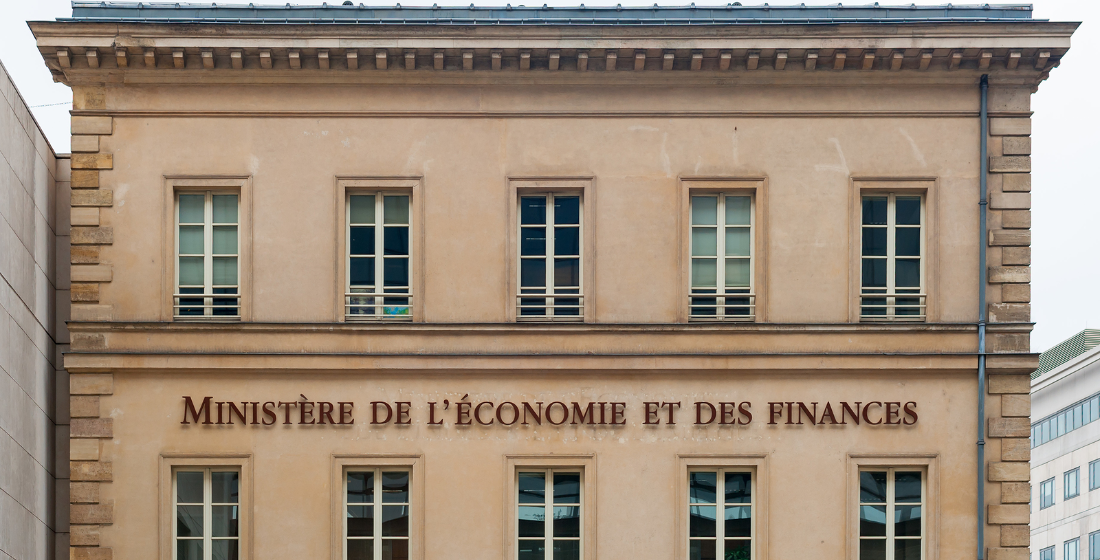Keynote: Pedal still to the metal on sustainability for France’s MoF
Gabriel Cumenge, deputy secretary of the French Ministry of Finance, DG Tresor tells TXF the importance of ECAs continuing their roles as the shock absorbers of global trade and driving the sustainability agenda through the current crisis.

TXF: How have you been responding or changing your offering amid the current Covid-19 crisis?
 Gabriel Cumenge (GC): First thing is that it was a crisis of such magnitude and which is a symmetric shock to many industries throughout the world. The first answer from an ECA and Finance Ministry point of view is that these public ECAs should play their counter-cyclical role as a shock absorber and also as a lender of last resort.
Gabriel Cumenge (GC): First thing is that it was a crisis of such magnitude and which is a symmetric shock to many industries throughout the world. The first answer from an ECA and Finance Ministry point of view is that these public ECAs should play their counter-cyclical role as a shock absorber and also as a lender of last resort.
The first change that we have made is not to change anything at all. And to keep open for business and take as benevolent an approach as possible to demands by companies, French companies, or customers worldwide, for new cover and/or for restructuring on existing cover and existing projects.
The second answer is that of course, with such a crisis, you need to go to further lengths in terms of public action to help cushion the shock. What's been announced by Bruno Le Maire, Minister of Economy and Finance, is that we have targeted specific measures of higher covering percentages for SMEs, notably, that might face liquidity issues. And second, because in the French ECA system, usually we do not have short term business, unlike other ECAs, we've restarted a mechanism that worked in the 2008 crisis after Lehman. That is a reinsurance mechanism for short term private insurers so that their short term lines are not cut for SMEs.
There will be a third action, but that will come in a later phase, which is already to start to think about the recovery phase. The pandemic by itself is by nature a transitory phase albeit very, very violent and very, very strong. But it will end sometime and then we will get back to some kind of normal economy, probably with a big worldwide recession. And that's where in this recovery phase, in a very, very down macro environment, public backing by ECA's will be critical. That would be our will change in offering amid the crisis.
TXF: As a side question to that, we just saw that the European Commission had put out guidance on marketable and non-marketable risks, basically opening up the markets risks area to ECAs. Is that something you are responding to as well?
GC: Yes, we responded to the requests for feedback by the European Commission on that point. And we definitely pushed them to open to all markets the possibility to intervene with public instruments because we felt this was needed, exporters told us that this was needed and private insurance companies told us it was needed. We are making use of all of the leeway that is permitted by the temporary crisis rules by the European Commission in terms of state aid, be they on that front or by getting more coverage for SMEs.
TXF: Moving on to the actual structure of what you do nowadays. Since Coface moved into Bpifrance, how has that changed what you offer to exporters?
GC: From our side, and even more for the operational guys of Bpifrance, this is already history because it dates back to 2017 and we've changed worlds. It changed in two ways. The first one is we now have the capacity to offer a much more comprehensive approach to SMEs going international. French SMEs are medium sized companies wanting to expand their business abroad, which wasn't really the case with instruments being divided between BPI as the public investment bank on the one hand and Coface dealing with the ECA business on the other.
The second change in is much better coverage of small and medium sized companies in France in various territories far from Paris. Coface didn't have coverage throughout the country, whereas there is something like 48 to 50 branches of BPI throughout French territories and regions where they are in close contact with the regional networks of the big banks. And that's where the leverage is for SMEs.
In a way, the transfer from Coface to Bpifrance got us a lot more a lot more outreach power towards SMEs than was the case before. It didn't really change the way we approach support to big companies or big projects where we are still relying a lot on the very good expertise of Coface, and BPI exports teams. They have accumulated a lot of expertise typically in fields like aircraft, cruise ships, military or big infrastructure projects. And that's where we're still very active. Some new products have also been launched since the transfer from Coface to BPI. Mainly the idea is to keep being proactive in support of big projects with an onus on SMEs, which was a weakness probably of the French offering [before].
TXF: Coming back to the current crisis, a lot of things have been parked or put to one side. When we do come back to normal, how successful has agency-backed finance been at implementing sustainable development goals and environmental social governance? And is this on track in spite of the crisis?
GC: A first thing on the successful implementation of SDGs and ESGs by agency backed finance, coming myself from a background of international financial institutions and multilateral issues, I'm quite impressed by the way that the culture of environmental and social issues and measuring the impact with due diligence is now fully part of the DNA of the community of export finance.
Also, with the rise of blended finance projects along with MDBs or DFIs, it helps getting accustomed to those kind of issues. This is definitely on track, but there is still also quite a lot of work to do. And for me and for the French government, it is absolutely key not to drop the efforts because of the crisis.
As I said before, I think the crisis by nature is temporary. The pandemic won't be there eternally, but it will, of course, have a profound impact on the global economy and global value chains afterwards. As a typical example, talking about big projects backed by sovereign countries, probably after the pandemics have passed in the next two, three, four years, we will see more defaults or restructuring of public debt due to the global recession and the global impacts of the pandemics.
Of course, this will need to be dealt with [using] as stringent as possible principles. But then after those restructurings, ECAs, will be part of the solution to rekindle those economies afterwards. And that's where we will need to be absolutely on track to implement the SDGs and ESGs.
That's where it is key that ECAs do not stop efforts to have the best standards in terms of environmental and social impact on the projects that they can find.
TXF: Digging down a little bit deeper in terms of how likely are changes to incentivise the delivery of sustainability goals. For instance do you expect reductions in ECA premiums for green project borrowers? Exclusions from ESIA evaluations? How likely are ESG-tied debt and sustainability linked loans to be a tangible reality for export finance as we’ve increasingly seen in commodity finance?
GC: The global question will there be changes to put in incentives for sustainable and environmental issues? The short answer is yes. The French government is already committed to ask for such changes in their regulatory framework...The French parliament last year introduced a specific provision in the 2020 budget bill stating that the French ECA should be leveraged to make ECA financing contribute to the transition towards the zero carbon economy.
Minister Le Maire has made it one of the key political objectives for in 2020 to help set up a global coalition of a critical mass of ECAs and countries pushing in that direction. It has become a really key topic for us and one of the overarching objectives of the whole ECA business in France. In concrete terms, we see three main efforts to be done in the coming years:
- Methodology
The first one is on the methodology, measuring your own carbon footprints and your own carbon impact. We started digging down on the portfolio of BPI. And it's not entirely clear how you deal with some specifics of the trade and export finance business. There are some methodological issues that need to be dealt with. It’s a common effort.
BPI has been adhering to the Poseidon principles that were launched last year by a couple of banks to measure the carbon footprint of the shipping portfolio compared to the objectives set up by the International Maritime Organisation. This is a first part in the efforts to refine the methodology.
All that's happening on the markets with ESG-tied debt/ transition bonds and those discussions are interesting because it opens new perspectives.
But of course, we will need to look at it through the lens of very stringent methodologies, because there are still a lot of different ways to approach carbon footprint measurement. Some are rigorous, some are not.
It will take some time for the markets and authorities to discriminate between valid methodologies and those that are not really conducive to the objective of the Paris Agreement. It may sound nerdy and technocratic, but to us, it's really key because this is a long standing effort and you need to rely on a sound methodological basis.
- Positive incentives
The second efforts are positive incentives for the export finance industry and for recipient countries to go greener and to get on a path of decarbonised growth. But from a public authority point of view, the key issue is not ‘green’ projects, it's ‘grey’ or ‘brown’ projects.
Let me explain. Green projects, of course, there are a lot already, a lot of liquidity and a lot of appetite in the private sector to cover that. I don't say that incentives by public agencies and by ECAs are not required. We will step up our own efforts on the French side to do more green projects because having gone through our portfolio so far, we have less than 1% of the BPI portfolio that would qualify as green and renewable energy. We can do much more. But at the same time, ECAs are lenders of last resort, the guys who are supposed to fill in where the private sector does not want to go anymore.
In the future, the question will be who is supposed to deal with those companies or those SMEs that are in a ‘grey zone’ or that are still a lot of ‘brown’ activities and that need to get some help in order to invest in new technologies that are greener and to shift their business from fewer brown activities to more green activities.
That needs to be supported by public authorities and ECAs and I see positive incentives for green projects, but also for the greening of projects and whole industries.
For instance, helping the chemistry industry decarbonise its process of production is key. It wouldn't qualify as green in terms of the EU taxonomy, of course, but it's still something where we should put a lot of effort for ECAs to help foster the industry, accelerating efforts towards greener production processes.
3) Getting out of coal
The third effort that we are we are working on quite heavily, and last but not least, is the fact that some industries are definitely not even brown, but really black. The one we should concentrate on for the next few years is coal. Coal mining and the coal industry is the most destructive you can imagine for climate change objectives. France wants to be at the heart of the global coalition to speed up the efforts to get out of coal financing.
In 2015, during the negotiations for the Paris Agreement and the COP21, France committed at a political level not to finance any coal-related project anymore, be it coal mining or coal power plants. We stuck to that and last year, in the 2020 budget bill, parliament voted to formally write into law that such financing is prohibited.
We've seen some movement from other ECAs. [Prime Minister] Boris Johnson in the UK announced that kind of a commitment early in 2020. We're seeing quite a lot of other ECAs going down that road. Some other countries in Asia are also considering making some movement, but there is still a lot of financing worldwide going to such projects, which is an issue.
So we want to be part of this coalition. At an OECD level, the common disciplines should tackle this issue and should help get out of businesses such as the coal industry. Of course, this will be a phased effort and sometime in the longer future there will be efforts to be made to help get out of fossil fuels. But coal is really of the essence right now. We need to tackle the issue and there is absolutely no excuse for complacency here.
TXF: With that call to action can you share your thoughts about what will be the reality of post-crisis 2020 and in terms of this agenda particularly?
GC: First let's hope that there will be such a thing as a 2020 post crisis, because the way the pandemic has developed region by region, it will take quite a time. A lot of industries will need a hand, a public hand, getting out of the crisis.
The aircraft or cruise ship businesses will be those where we will probably need to put more action and to have more public authorities and ECAs in the business because there will need to be some more public money involved in the recovery post-crisis. The post-crisis 2020 is a world where public efforts to help the economy weather the crisis won’t stop, but will still go on for a few years.
Talking about environmental and social issues, these haven’t gone away with the crisis. They will come back all the more urgently after the crisis. Hopefully the post-crisis 2020 world of pandemics and the lessons learned will have shown that global issues can only be dealt with by global solutions. With cooperation between all major regions it will help foster a coordinated answer to those questions.
That's maybe a more a wish than a prediction. From the French government and French ECA point of view it will be key that all major countries and all major ECAs act in as coordinated a manner as possible, be it on the question of recovery of the global economy, but also on the question of climate change and environmental sustainability.
TXF: I guess the very fact that they've been able to coordinate very quickly on the EC response to issues like marketable and non-marketable risks, that's a good sign that there will be more cooperation going forward.
Cumenge will speak at the TXF Global 2020: Export, Agency and Project Finance, on both the virtual event, June 1-5, and the physical event September 2020, please go here for more information.





